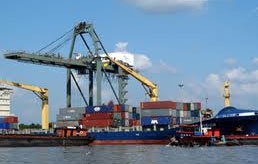A taxing headache set to ease
 On January 1, 2012, the Ministry of Finance’s Circular 157/2011/TT-BTC will come into force.
On January 1, 2012, the Ministry of Finance’s Circular 157/2011/TT-BTC will come into force.
The circular states: “If exported goods are verified to have been produced and processed from wholly imported materials, they will be exempt from export tariff payments.”
At present, all exported goods produced and processed from imported materials are subject to export tax levels of zero per cent or above zero per cent, meaning that all necessary procedures still need to be completed and this can take time.
An industry insider at Danang-based 28 Garment Joint Stock Company said most of the company’s exported products were made from imported materials and the products were exported at a tax level of zero per cent under the circular.
“It takes at least seven days to fulfil the related customs procedures, which is too long. This new regulation of course benefits the company,” said the insider. Nguyen Viet Thang, vice director of the Ministry of Defence’s Hanoi-based X26 Joint Stock Company - which ships 20 per cent of its garment products, said currently each type of imported material needed a separate customs declaration.
“Regulations on making customs declarations are so complicated and time-consuming,” Thang said. The new circular also regulates that when exported goods are produced or processed from both domestically-sourced and foreign-imported materials, export tax exemptions are applied to the volume of exported goods tantamount to the volume of imported materials used to make the goods.
The remaining volume of goods produced and processed from locally-sourced materials will be subject to its normal export tax levels. These new rules update regulations in Circular 194/2010/TT-BTC dated December 6, 2010 on guiding customs procedures and tax management for exported and imported goods.
That document failed to clearly stipulate export tariff exemptions for exported goods which were produced from both domestically-sourced and foreign-imported materials. Circular 194 only said in cases where exported goods were produced from both domestically-sourced and foreign-imported materials, the export tax must be paid on those imported materials used to make the goods for export.
Thang said the new rules would allow exporters to take the initiative when it came to export performance. “We often have to seek explanations from customs agencies as to how much of our products can be exempted from export tariffs and the process is also complicated. Now we can enjoy export tax exemptions based on the calculation of the volume of goods equivalent to that of materials used,” he said.
Circular 157 also states exporters who want to take advantage of these export tax priorities, will have to submit a series of documents and declarations to customs agencies, including paperwork verifying that materials used to make goods for export were imported.
What the stars mean:
★ Poor ★ ★ Promising ★★★ Good ★★★★ Very good ★★★★★ Exceptional
Related Contents
Latest News
More News
- 0.1 per cent tax proposed on each transfer of digital assets (February 05, 2026 | 17:27)
- Ministry of Finance tightens policy delivery at start of year (February 05, 2026 | 17:26)
- Vietnam steps up market reforms as FTSE Russell reviews upgrade progress (February 05, 2026 | 17:20)
- 2025 profits mixed amid strong energy and farming results (February 05, 2026 | 17:18)
- Cashless payments hit 28 times GDP in 2025 (February 04, 2026 | 18:09)
- SSIAM and DBJ launch Japan Vietnam Capital Fund (February 04, 2026 | 15:57)
- Banks target stronger profits, credit growth in 2026 (February 04, 2026 | 15:43)
- Vietnam on path to investment-grade rating (February 03, 2026 | 13:07)
- Consumer finance sector posts sharp profit growth (February 03, 2026 | 13:05)
- Insurance market building the next chapter of protection (February 02, 2026 | 11:16)

 Tag:
Tag:



















 Mobile Version
Mobile Version